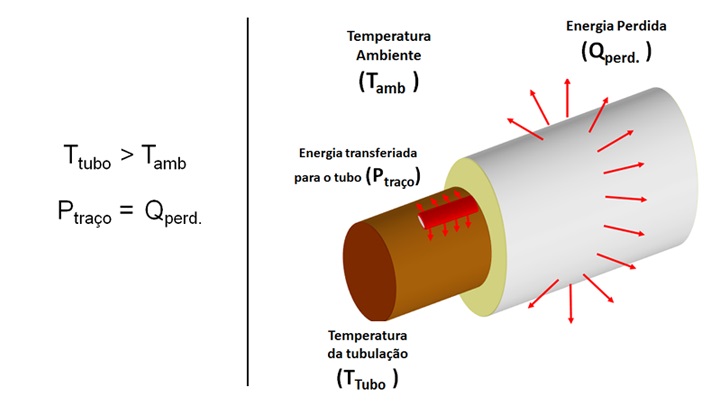As there is no “perfect” thermal insulation, the piping will lose heat to the environment (Qlose.), this way the electric tariff has the objective of restoring the energy in the form of heat (Section) and equalize a permanent regime where the lost energy equals the energy transferred from the electrical trace to the pipe, that is, Qperd. = Section . Video outline to follow:
Electric Trace
What is the Electrical Trace?
The Electric Trace is used in industrial processes to perform temperature maintenance by replacing energy in the form of heat. Its main use is to prevent the increase in viscosity and/or the crystallization of fluids in pipes, tanks, glasses, connections and equipment.
How does it work
A typical application is to keep the process temperature constant (Tube).

Self-Adjusting Cable Models

Temp. maintenance: up to 65ºC
Maximum Exposure: 85ºC
T-Rating: T6
Available Powers: 3W/ft; 5W/ft; 8W/ft; 10W/ft

Temp. maintenance: up to 110ºC
Maximum Exposure: 110ºC
T-Rating: T4
Available Powers: 10W/ft; 15W/ft; 20W/ft

Temp. maintenance: Up to 121ºC
Maximum Exposure: 250ºC
T-Rating: T3
Available Powers: 3W/ft; 5W/ft; 8W/ft; 10W/ft; 12W/ft; 15W/ft; 20W/ft

Temp. maintenance: Up to 150ºC
Maximum Exposure: 250ºC
T-Rating: T3
Available Powers: 5W/ft; 8W/ft; 15W/ft; 20W/ft
Series Resistance Cable Model

Circuit length: up until 451 m a 480 Volts
Maximum maintenance temperature: up to 235ºC
Maximum temperature exposure temperature: up to 260ºC
Power Self-Limiting Cable Model

Can be used for transfer lines up to 1,500m
Maximum exposure temperature: up to 650ºC
High output power: up until 200 Watts/m
Rated power: up until 600 Volts AC
We specialize in efficiency energetic.
Request your free quote!

